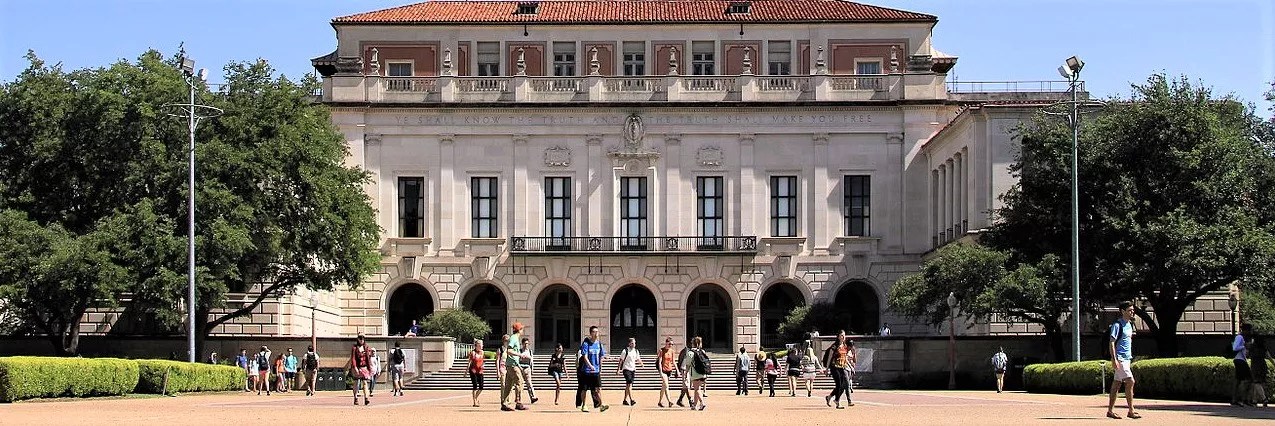
Larry D. Moore CC BY-SA 3.0 Wikipedia

Audio By Carbonatix
We don’t even yet know how much of it is true, but the $25 million college admissions bribery scandal described in a federal indictment in Massachusetts last week has already ignited a firestorm of blame-laying, which should fill my heart with joy.
The blame game, after all, is my personal sport. I’ve always thought it should be in the Olympics. But I don’t know. Some of this stuff is all over the place.
The New York Times took note last week that some of the alleged cheating involves parents who paid smart kids to take SAT exams for their own less smart kids. The Times headline was, “Is the College Cheating Scandal the ‘Final Straw’ for Standardized Tests?” The suggestion was that colleges and universities may have to cut back on standardized testing because some people are cheating on the tests.
Really? It’s the test’s fault? How about instituting even more standardized testing, making the tests even tougher but cutting back on cheating? Isn’t that a more direct path to the problem?
Some of the cheating scandal has touched the University of Texas in Austin, and The Texas Tribune, a nonprofit online news service, reported last week that Gov. Greg Abbott was in a righteous lather about it:
“As far as the University of Texas is concerned — but I will expand this to every university in the state of Texas — it’s important for every university to go back and re-evaluate, to study and to investigate their admissions processes to make sure that nothing like this either is happening or can happen,” Abbott told a news conference last week, according to the Tribune.
How about instituting even more standardized testing, making the tests even tougher but cutting back on cheating? Isn’t that a more direct path to the problem?
Remind me when I fly somewhere to pocket some extra barf bags from the plane so I’ll have them on hand next time I have to read The Texas Tribune. Are you kidding me? Four years ago Dallas businessman Wallace Hall, a member of the University of Texas System Board of Regents, uncovered evidence, confirmed in a later third-party investigation, of deep-rooted admissions cheating at UT Austin and the UT law school. Abbott, then Texas attorney general, banded together with a pack of angry baying wolves in the Legislature to shut Hall up and prevent him from exposing the full extent of the scandal to the public.
Why was the Legislature so rabidly committed to muzzling Hall? Because the particular kind of cheating Hall uncovered had a lot to do with Texas legislators shoehorning their own kids and kids of influential constituents into UT undergrad and the law school in exchange for legislative favors to then president of the university, the late Bill Powers.
In coverage of the current scandal alleged by the U.S. attorney for Massachusetts, much of the commentary includes hand-wringing over income disparity in the nation and bad behavior by a wealthy aristocracy. If that’s the answer, then we’re going to have to expand the definition of aristocracy. It will have to include special friends of Democratic state Sen. Judith Zaffirini of the 21st District in Laredo.
So successful were Zaffirini and other powerful legislators in persuading Powers to grant admission to their personal favorites that the law school, always known as one of the nation’s top, started getting more ink for churning out graduates who couldn’t pass the bar exam. Reporter Jon Cassidy of Watchdog.org developed a database of UT law grads in 2006-13 who failed the bar exam in multiple tries and came up with the following interesting detail:
“Of nearly 2,700 UT Law grads,” Cassidy reported, “just 197 needed to retake the test. I found 90 who failed it twice. And I found 29 who failed it three times or more.
“That last group of 29 included Zaffirini’s son Carlos, as well as Jeffrey Carona, son of Republican state Sen. John Carona, and Ryan Pitts, son of Rep. Jim Pitts, the House Appropriations Committee chairman. It also included these five: a lobbyist who’d worked for House Speaker Joe Straus, a legislative director, the former chief of staff for a congressman, the son of a major Zaffirini donor and state Rep. Eddie Rodriguez.”
I don’t know about you, but that doesn’t sound to me like a bunch of arrogant Waspy hoity-toits. It doesn’t sound like sons and daughters of movie stars or the spoiled offspring of entitled tech titans. Most of the people involved in the Texas admissions cheating scandal uncovered by Hall always sounded to me more like your good old American smorgasbord of main chance slicks. Open that door one crack, and those slicks will squeeze through.
When former UT President Powers died just a couple of weeks ago, before the Massachusetts story broke, The Texas Tribune, which has been subsidized by UT over the years to the tune of many millions of dollars, wrote a glowing obituary in which one of Powers’ many accomplishments, they said, was stifling the Hall investigation:
“One UT System regent in particular, Wallace Hall, conducted numerous investigations into Powers and the university, requesting more than 800,000 pages of documents from the university.”
That was one of the terrible accusations against Hall, that he requested documents. In fact what he sought would have been about two three-foot stacks of file boxes, but the Tribune consistently took the line anyway that Hall was trying to destroy the university by demanding so many documents — quite an interesting position for a journalistic enterprise.
“The efforts were highly controversial,” the Tribune obit went on. “Hall was investigated by a select committee of the Texas House, and a Travis County grand jury declined to indict Hall but recommended his removal from office.”
Yeah, let’s see if we can untangle that particular prose hairball for you a bit. As soon as the legislators who had been using the cheat system at UT got wind of what Hall was uncovering, they convened a special new committee to impeach him as a regent, a thing that just doesn’t ever happen. And it didn’t ever happen. There were no grounds.

Wallace Hall uncovered a culture of cheating on admissions at UT. Gov. Greg Abbott helped run him off the board of regents.
Can Turkyilmaz
So the wounded wolves in the Legislature referred the matter to a Travis County grand jury on half-muttered loosey-goosey grounds having something to do with “abuse of official capacity.” The grand jury kicked it without charges because, after all, looking into corruption and violations of the rules at UT was not an abuse but an exercise of Hall’s official capacity and duty as a regent of the UT system.
Finally the recent Texas Tribune obituary of Powers gave him an attaboy for outlasting Hall, who was non-renewed from his post on the board in 2017 by Abbott, who was by then governor. “By the time he stepped down,” the obit said fawningly, “Powers was the second-longest-serving president in UT-Austin history — and the voices pushing for major changes at UT-Austin were quieting.”
Don’t we need a deeper look in the mirror and a longer moment of silence?
Yeah, well that was that week. A week later the Massachusetts story broke. Maybe the Tribune can go back in and add a new weather update to the online version of its Powers obit, like, “Voices pushing for change have picked up again slightly in recent weeks but are not expected to reach gale force on area lakes.”
None of what I am recounting here should be taken as an effort to dismiss or diminish the significance of the new admissions scandal. Quite the contrary, this new case probably illustrates the power and importance of federal prosecutions. If the Hall story illustrates anything, it shows the depths to which local and state power-wielders and opinion-makers including the media will lower themselves to protect a valuable scam. The Massachusetts indictments may show the amount of elevation and power it takes for prosecutors to get up out of that muck and be free to enforce the law.
But is all this reflexive finger-pointing really going to get us anywhere near the nature of the problem? Some of the stories have portrayed it as basically a racial paradigm, for example. The headline over a New York Times story last week called it “a harsh lesson in racial disparities.” The story said, “For students of color who have found their qualifications questioned when they arrive at elite campuses, the case was dispiriting.”
That’s hard to believe. So the black kids are standing around saying to each other, “Oh, I’m so dispirited. It’s come out that some of those rich white kids aren’t as smart as they said they were.” I kind of think of the black kids standing around laughing their socks off.
I do get the proposition. It is that the white people say the black kids are cheating when their admission is influenced by some form of affirmative action, but then the same white people cheat. I would be inclined, however, to just drop all of the aspersions against affirmative action from the conversation, because that’s the kind of thing a certain kind of person is always going to say, and that person is always going to be the one who then cheats to get his or her own kid in. It’s all just sort of cheaters logic anyway. I’m not cheating, you are. Spoken like a cheater.
The more remarkable and important thing exposed in the Massachusetts accusations and reflected in the Wallace Hall story here is the universality of the cheating culture. This is not to let anybody off the hook, especially Waspy hoity-toits and movie stars, who I believe should just be on the hook full-time no matter what, even when they’re innocent. But don’t we need a deeper look in the mirror and a longer moment of silence? What is it in the broader culture that would cause parents of any description to teach a child that her basic dignity and worth in life must be founded on cheating?